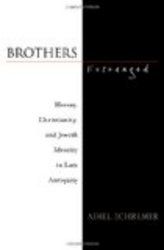Description
This essay discusses how the rabbis viewed Christianity and how this affected their identity as Jews. Schremer argues that the rabbis were motivated to create a new identity for Jews after the destruction of the temple in 70 CE. He cites scholarship that shows that the rabbis were hostile to Christianity and that this hostility was a major factor in the construction of Jewish self-identity.
The emergence of formative Judaism has traditionally been examined in light of a theological preoccupation with the two competing religious movements, 'Christianity' and 'Judaism' in the first centuries of the Common Era. In this book Ariel Schremer attempts to shift the scholarly consensus away from this paradigm, instead privileging the rabbinic attitude toward Rome, the destroyer of the temple in 70 C.E., over their concern with the nascent Christian movement. The palpable rabbinic political enmity toward Rome, says Schremer, was determinative in the emerging construction of Jewish self-identity. He asserts that the category of heresy took on a new urgency in the wake of the trauma of the Temple's destruction, which demanded the construction of a new self-identity. Relying on the late 20th-century scholarly depiction of the slow and measured growth of Christianity in the empire up until and even after Constantine's conversion, Schremer minimizes the extent to which the rabbis paid attention to the Christian presence. He goes on, however, to pinpoint the parting of the ways between the rabbis and the Christians in the first third of the second century, when Christians were finally assigned to the category of heretics.
